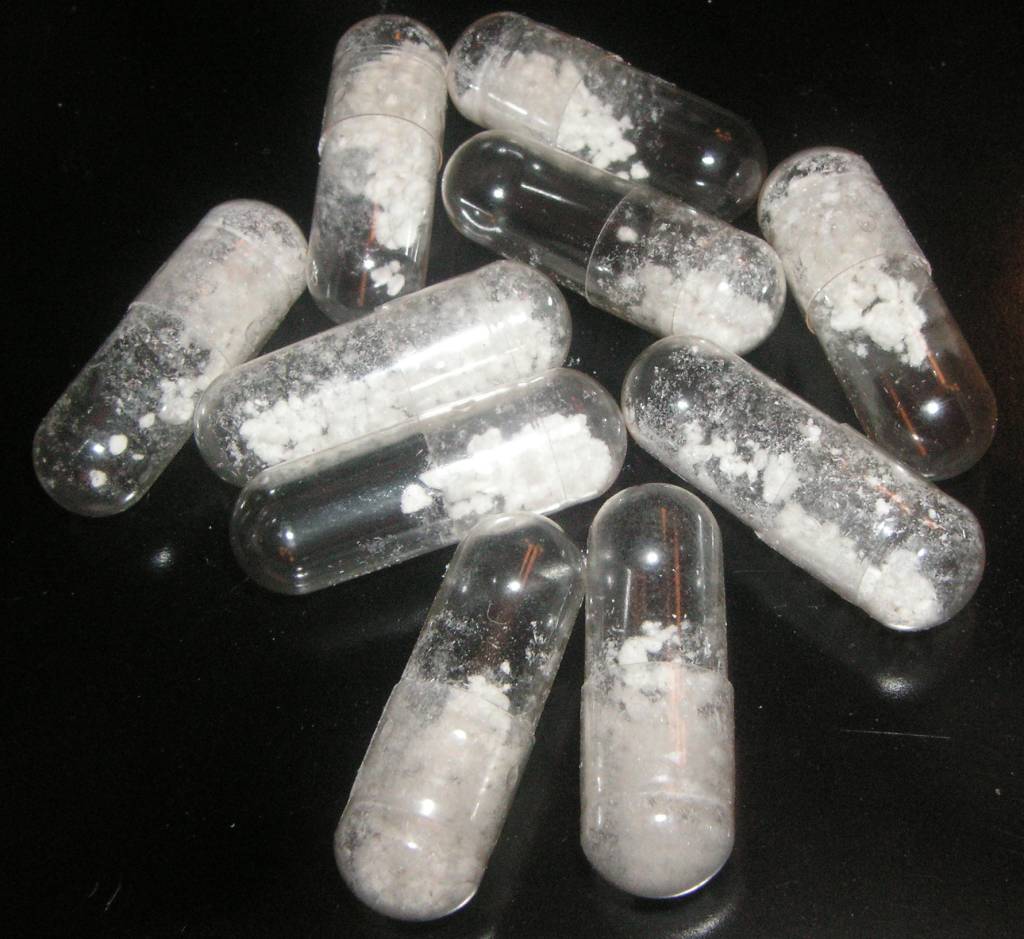Drug Crimes Involving PCP in California

Phencyclidine (PCP), also known as “angel dust,” is a white powder that can be ingested, smoked, inhaled, or injected. It causes serious hallucinations. In the 1950s, it was prescribed as an anesthetic, or painkiller. It was taken off the market in 1965 and is no longer generally prescribed for human use.[i] The U.S. Uniform Controlled Substances Act and the California Uniform Controlled Substances Act both define PCP as a Schedule II drug.[ii]
A Schedule II drug is a drug that has a high potential for abuse, less abuse potential than a Schedule I drug, and a use that can potentially lead to severe psychological or physical dependence.[iii] Other Schedule II drugs include cocaine, methamphetamine, fentanyl, and oxycodone (OxyContin).[iv]
Prosecution for PCP Crimes

A prosecutor can charge a defendant with use, manufacture, possession, sale, or transport of PCP. Possession can be defined as possession for personal use, possession with intent to manufacture, or possession with intent to sell.
In order to convict you of possession of PCP, prosecutors must prove all of the following:
- You unlawfully possessed PCP;
- You knew of its presence;
- You knew of the substance’s nature or character as a controlled substance;
To determine whether a defendant has committed the crime of possession with intent to sell PCP, law enforcement officers will look for evidence of sales in the form of:
- Digital or paper communications, such as voice recordings, emails, instant messages, and texts. These include sales records, aka “pay and owes;”
- Separate packages of PCP, or multiple empty bags and vials;
- Scales or other measuring equipment;
- Cash; and/or
- Multiple cell phones or digital devices.
Defenses to PCP Crimes

A skilled criminal defense attorney can assert a variety of defenses in your case. Potential defenses include:
- Lack of knowledge. Another person gave you the substance and you did not know it was PCP. You then took certain actions, such as consuming or possessing the drug, while you were unaware of what you were doing. Also, you may have had a lack of knowledge as to the amount of the substance. You were not aware of how much of the substance was present.
- Lack of intent. You did not intend to engage in any illegal action with the substance.
- Lack of control. You had no control over the substance. This defense is commonly used in cases of constructive possession. Here your attorney would argue that you did not possess the drug even though circumstances indicated that you controlled the drug or a container in which it was found.
- Insufficient evidence. If a law enforcement officer did not find you in possession of PCP, and there was no drug test such as a blood test to confirm that you used the drug, there is no evidence that you were under the influence of PCP.
- Entrapment. A law enforcement officer induced you to commit a criminal offense, such as possession, that you otherwise would have been unlikely to commit.
- Illegal search and seizure. Your attorney can also seek to have evidence excluded from a case. This action would be the result of a successful hearing on a motion to suppress. A motion to suppress is appropriate when a law enforcement officer did not have a valid warrant or probable cause to seize you or search your belongings and residence. If critical evidence is excluded from a case, the prosecutor will be unable to prove all the elements of the case beyond a reasonable doubt.
Sentencing for Various Crimes Involving PCP
There are different penalties for the many potential charges you may face for crimes involving PCP.
Under the Influence of PCP – Health and Safety Code 11550

If at the time of your arrest, you were under the influence of PCP, you will be found in violation of HS 11550.[v] You are determined to be under the influence of a narcotic drug when your physical and mental abilities are “impaired in any detectable manner.”[vi] The penalty for this offense is incarceration for 90 days to 364 days in the county jail.[vii] Certain defendants may be eligible to complete a drug diversion program rather than go to jail.
Personal Possession of PCP – Health and Safety Code 11377
If you are in possession of PCP without a prescription in an amount appropriate for personal use, you can be charged with a violation of HS 11377.[viii] This offense is charged as a misdemeanor. The penalty is up to 364 days in county jail.[ix] Additionally, you can be fined up to $1,000.[x] If you have one or more prior convictions for this offense, the crime can be charged as a felony.[xi] The penalty for this offense charged as a felony is 16 months or two or three years in state prison.[xii] In addition to being incarcerated, you can also be fined up to $10,000.[xiii]
Possession for Sale of PCP – Health and Safety Code 11378.5
If you possess or purchase PCP or any analog or precursor of PCP for sale, the offense is a violation of HS 11378.5.[xiv] The offense is a felony punishable by three, four, or five years in prison. You can also face a fine up to $10,000.[xv] This offense involves having the intent to sell the drug to another individual or entity, such as an organization. If the weight of the PCP exceeds one kilogram (2.2 pounds) or 30 liters by liquid volume (approximately 7 gallons), you face an additional three to 15 years in prison.[xvi]
Transportation of PCP for Sale– Health and Safety Code 11379.5
If you sell or transport PCP, the offense is a violation of HS Section 11379.5.[xvii] The penalty is three, four, or five years in prison. If you transport PCP across three or more counties, three, six, or nine years in prison can be added to your sentence.[xviii]
Selling PCP to a Minor – Health and Safety Code 11380
If you involve a minor in the sale of PCP, the offense is a violation of HS Section 11380. The penalty is three, six, or nine years in prison.[xix]
Selling PCP to a Minor in a Protected Area – Health and Safety Code 11380.1
If you sell PCP to a minor crime in a protected area such as a church or synagogue, playground, public or private youth center, day care facility, or public swimming pool, the offense is a violation of HS 11380.1.[xx] The penalty is one year in prison. If you commit such a crime within 1,000 feet of a public or private elementary, vocational, junior high, or high school when minors in the building, the penalty is up to two additional years in prison.[xxi] If you commit the offense within 1,000 feet of a drug treatment center, detox facility, or homeless shelter, the penalty is one additional year in prison.[xxii]
Under PC 1170.82, if you knew or reasonably should have known that the person to whom the PCP was sold was pregnant, had previously been convicted of a violent felony, or was being treated for a mental health disorder or a drug problem, you can be punished to the fullest extent of the law.[xxiii] As an example, if your potential penalties were three, six, or nine years in prison, the court could use the facts of the case to sentence you to nine years.
Manufacture of PCP – Health and Safety Code 11379.6
If you manufacture PCP, the offense is a violation of HS Section 11379.6.[xxiv] The penalty is three, five, or seven years in prison and a fine up to $50,000. If you manufacture PCP in a structure where a child under 16 is present, the offense is a violation of HSC Section 11379.7. This offense is punishable by an additional two years in prison.[xxv]
Driving Under the Influence of PCP – California Vehicle Code 23152(a)
If you drive under the influence of PCP, you can be found to have committed a DUI in violation of California Vehicle Code Section 23152(a).[xxvi] Your penalty is determined by whether this is a first, second, third, or fourth or beyond violation.[xxvii] Upon a first-time DUI conviction, you may face up to 364 days in county jail.
Frequently Asked Questions (FAQs)
- When PCP is combined with ecstasy (MDMA), marijuana or crack cocaine, is possession of it still illegal?

Yes. PCP combined with marijuana is street-named “killer joint” or “supergrass.” PCP combined with crack cocaine is called “beam me up.” There are tablets of ecstasy that contain PCP. When a combination of substances is found, a prosecutor can charge the defendant with possession of all substances.[xxviii]
- Can two or more people possess PCP at the same time?
Yes. Two or more people can actually be touching or hold control over a single object, such as a bag containing PCP. Thus, both people can be charged with this crime.
- Do I have to actually hold or touch a container or pipe to possess it?
No. Your possession of the PCP can be determined from your having control over an item, or the right to control the item, either personally or through another person.
- Can I participate in a drug diversion program instead of going to jail or prison?
Yes, if you are a nonviolent offender and are convicted of possession of PCP in an amount appropriate for personal use. If you successfully complete the drug diversion program, your PCP charge will be dismissed at the end of the program. The programs are available under California Proposition 36 and PC Section 1000.
Drug diversion programs are not available to those who are simultaneously charged with another misdemeanor offense not involving drug possession, simultaneously charged with a felony, or convicted of selling or transporting heroin.
You should speak to an experienced attorney to determine whether you are eligible for a drug diversion program.
What Wallin & Klarich Can Do For You

If you have been charged with use, possession, sale, or transport of PCP, call a Wallin & Klarich criminal defense attorney right away. Our experienced criminal attorneys have over 40 years of experience in successfully defending clients against drug-related charges, including those involving PCP. Let us help you today.
We have offices in Los Angeles, Sherman Oaks, Torrance, Tustin, San Diego, Riverside, San Bernardino, Ventura, West Covina and Victorville, we can help you no matter where you work or live.
Call us today at (877) 4-NO-JAIL or (877) 466-5245 for a free phone consultation. We will get through this together.
[i] National Institute on Drug Abuse: DrugFacts: Hallucinogens – LSD, Peyote, Psilocybin, and PCP. See http://www.drugabuse.gov/publications/drugfacts/hallucinogens-lsd-peyote-psilocybin-pcp
[ii] 21 CFR §§1300-1308; HSC §§ 11053-11058, respectively.
[iii] U.S. Drug Enforcement Administration, Drug Scheduling. See http://www.dea.gov/druginfo/ds.shtml.
[iv] U.S. Drug Enforcement Administration, Drug Scheduling. See http://www.dea.gov/druginfo/ds.shtml.
[v] HSC § 11550.
[vi] People v. Enriquez (1996) 42 Cal.App.4th 661, 665.
[vii] HSC § 11550(a).
[viii] HSC § 11377.
[ix] HSC § 11377(a).
[x] PC § 672.
[xi] HSC § 11377(a).
[xii] PC § 18.
[xiii] PC § 672.
[xiv] HSC § 11378.5.
[xv] PC § 672.
[xvi] HSC § 11370.4.
[xvii] HSC § 11379.5(a).
[xviii] HSC § 11379.5(b).
[xix] HSC § 11380(a).
[xx] HSC § 11380.1(a).
[xxi] HSC § 11380.1(b).
[xxii] HSC § 11380.7(a).
[xxiii] PC § 1170.82(a),(b), and (c).
[xxiv] HSC § 11379.6(a).
[xxv] HSC § 11379.7(a).
[xxvi] VC § 23521(a).
[xxvii] VC §§ 23536 and 23538.
[xxviii] U.S. Drug Enforcement Administration: Phenycyclidine. http://www.deadiversion.usdoj.gov/drug_chem_info/pcp.pdf

